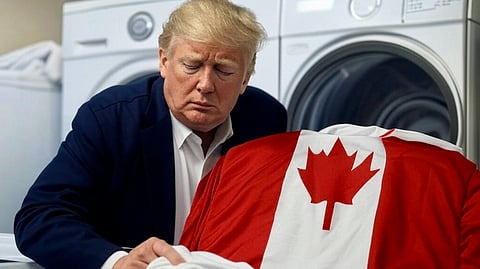

He’s proving to be more wishy-washy than a washing machine on the issue of Canadian tariffs.
And it's hanging Alberta's oil and gas sector out to dry.
If stock markets are any indication, US president Donald Trump’s plans to penalize the ‘Dirty Dozen’ of his favourite trade laggards on April 2 appears to have been tossed out with the bathwater as The Donald takes a softer line on ‘sector-specific’ industries.
Initially planned to encompass broad industries such as automobiles, semiconductors, and pharmaceuticals, American news outlets like The Wall Street Journal are reporting that Trump is now considering excluding certain sectors from immediate impact.
Even though oil and gas would seem to fall in the ‘sector-specific’ boundary, the only mention of energy was a 25% tariff on any country purchasing oil from Venezuela, effective April 2.
Although China is by far the largest buyer of Orinoco heavy oil (a good substitute for Western Canadian Select), the Good Ol’ US buys — and produces — about 20% of the South American country’s output. India resumed Venezuelan purchases after the Biden administration lifted sanctions last year.
Of particular concern to Canada, and Alberta’s oil and gas sector, is the ambiguity surrounding potential tariffs. Canada, with a USD$63 billion goods trade surplus with the US — almost all of it oil — is high among the nations potentially targeted in Trump’s Dirty Dozen trade laggards (but not Russia).
The prospect of even a 10% tariff on Alberta’s oil and gas exports raises questions about the US’ ability to compensate for the 4.5 million barrels per day (bpd) it imports from Canada, with higher-cost barrels from states like Alaska unlikely to bridge the gap before the end of the next decade.
Nonetheless, Trump’s almost daily gesticulations on the topic sparked a significant rally in stock markets on Monday.
In New York, the Dow Jones surged 500 points or 1.2%, while the S&P 500 and Nasdaq Composite rose 1.5% and 1.8%, respectively. Even the Toronto Stock Exchange leaped 368 points or 1.5% in response to Trump’s tariff strategy — or lack thereof.
Historically, Trump’s policy announcements have contributed to market fluctuations, prompting the administration to consider market reactions in its decision-making process.
Complicating matters, the lack of clarity regarding the scope and targets of the forthcoming tariffs continues to create uncertainty.
Analysts said this not only influences market dynamics but also leaves key trading partners like Canada in a precarious position, particularly affecting sectors integral to their economies such as Alberta’s oil and gas industry.
Alberta Premier Danielle Smith has been vocal about the potential repercussions of US tariffs on Canadian energy exports, especially in an election.
In an interview with Breitbart News, Smith criticized former prime minister Justin Trudeau’s handling of initial tariff negotiations with Trump, suggesting that early missteps have exacerbated current tensions.
She emphasized the mutually beneficial nature of U.S.-Canada trade, particularly in the energy sector, and expressed concern that prolonged disputes could inadvertently bolster the Liberal Party’s standing amid rising nationalist sentiments.
Carney’s campaign is positioning itself as a referendum on resisting Trump’s policies, aiming to unite Canadians against “external” pressures.
But Smith’s stance against imposing reciprocal export taxes on Canadian oil despite potential US tariffs, underscores what she describes as “commitment” to maintaining stable North American energy supplies.
Despite cries of disloyalty from other premiers, she has consistently warned that such measures could precipitate a massive energy crisis in the US, given the integrated nature of North American energy markets and the significant volume of Canadian oil funneled to American refineries.
“Let’s just put things on pause so we can get through an election,” she said. “The longer this (tariff) dispute goes on, politicians posture, and it seems to be benefiting the Liberals right now.”
